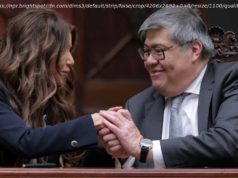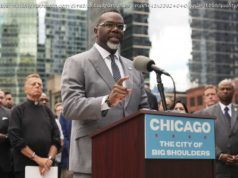It was an awkward White House press briefing.
President Donald Trump’s public feud with Attorney General Jeff Sessions keeps getting uglier — and may soon lead to the unceremonious ouster of one of the president’s earliest and most enthusiastic supporters.
On Thursday, after an unusually public series of potshots between Trump and Sessions, reporters repeatedly asked White House press secretary Sarah Huckabee Sanders whether the attorney general’s job was safe. Sanders’s answer was, to put it mildly, less than reassuring.
“The president made his frustrations very clear, and I don’t have anything else to add,” she said at one point.
When a reporter asked if Trump planned to remove Sessions from the Justice Department, she simply replied, “Not that I know of.”
It’s the latest installment in the months-long cold war between Trump and Sessions over the president’s belief that Sessions should be doing more to shield him from the sprawling investigation into whether the Trump campaign colluded with Russia (which, it should be said, isn’t Sessions’s job).
Trump’s associates have said openly that the president has tried to humiliate Sessions into resigning; Sessions has told aides he’s not going anywhere voluntarily.
A blow-up was probably inevitable. And it happened, repeatedly and publicly, over the past 24 hours alone.
On Wednesday, Trump complained that Sessions wouldn’t corroborate a conspiracy theory of a widespread conspiracy in federal law enforcement against Trump.
That is, of course, nonsense. Trump believes the FBI tricked the Foreign Intelligence Surveillance Court (FISC) to surveil a former campaign member, Carter Page, based on a Democrat-connected dossier. That supposedly started the process that eventually led to special counsel Robert Mueller’s investigation into possible Trump-Russia collusion during the 2016 presidential election — a probe Trump consistently labels a “WITCH HUNT!”
Trump, however, is wrong. We now know the Trump-Russia investigation began because a former Trump campaign aide, George Papadopoulos, told Australia’s ambassador to the UK that Russia had “dirt” on Hillary Clinton in the form of thousands of hacked emails.
Further, surveillance of Page was justified by ample corroborating evidence beyond the so-called “Steele dossier” and was renewed several times because judges — all appointed to the federal bench by GOP presidents and selected for FISC duty by Supreme Court Justice John Roberts, who was also appointed by a Republican — deemed the ongoing surveillance to be fruitful.
Trump, however, still believes what Fox News tells him: He’s the victim. In a move clearly intended to mollify the president, Sessions on Tuesday asked the Justice Department’s inspector general to look into the alleged abuse. Whatever the intent, that clearly wasn’t enough for Trump.
And then it got a little dramatic. On Wednesday night, Sessions had a very public night out with Deputy Attorney General Rod Rosenstein and Solicitor General Noel Francisco.
As my colleague Matt Yglesias pointed out, the seemingly innocuous meal was actually a public display of defiance: It “was a powerful symbol of both the attorney general’s independence from Trump and the limits of that integrity.”
Here’s why: Sessions and Rosenstein are in Trump’s crosshairs because they won’t stop Mueller’s probe. For Sessions to dine with Rosenstein on the same day Trump called him out on Twitter shows that the attorney general has started to distance himself from the president.
As we saw from Thursday’s White House briefing, Trump is just as willing to distance himself from Sessions — and that means the controversial attorney general may soon be looking for a new job.






